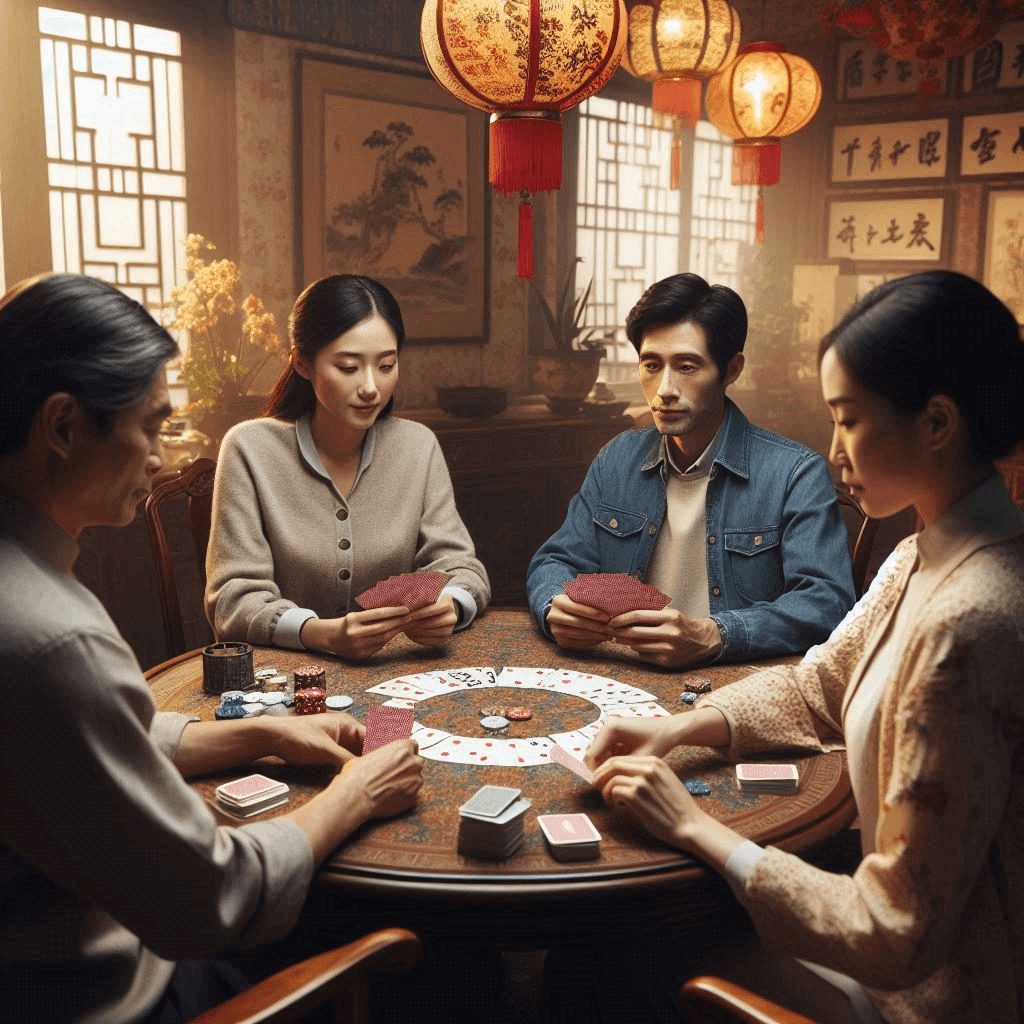Full House Chinese Poker, also known as “Big Two” or “Deuces Wild,” is a captivating and complex card game that has gained immense popularity among poker enthusiasts worldwide. With its fast-paced gameplay, strategic depth, and exciting twist on traditional poker, this variant has become a staple in many gaming circles. Whether you’re a seasoned player or a newcomer to the game, mastering the art of Full House Chinese Poker can be a challenging yet rewarding experience.
In this comprehensive article, we will delve into the intricacies of Full House Chinese Poker, providing you with expert tips and techniques to elevate your gameplay and help you navigate the nuances of this dynamic card game.
The Fundamentals of Full House Chinese Poker
Full House Chinese Poker is a variation of the traditional Chinese Poker game, which itself is a derivative of the classic Poker game. The objective of the game is to create the best possible three-card hands in three different positions: the front (or low), the middle, and the back (or high).
The game is typically played with a standard 52-card deck, and each player is dealt 13 cards at the start of the game. Players then arrange their cards into the three hands, with the front hand containing the three weakest cards, the middle hand containing the next four strongest cards, and the back hand containing the four strongest cards.
The key to success in Full House Chinese Poker lies in the strategic placement of your cards across these three positions. Players must carefully consider the strength of their cards, the potential combinations, and the likelihood of their opponents’ hands in order to gain an advantage.
Mastering the Art of Card Placement
One of the fundamental aspects of Full House Chinese Poker is the strategic placement of your cards across the three positions. This decision-making process is crucial, as it can significantly impact the outcome of the game.
Here are some expert tips to help you master the art of card placement:
- Understand Card Hierarchy: Familiarize yourself with the card hierarchy in Full House Chinese Poker. The rank of the cards, from strongest to weakest, is as follows: Aces, Kings, Queens, Jacks, 10s, 9s, 8s, 7s, 6s, 5s, 4s, 3s, 2s. This knowledge will be essential in determining the optimal placement of your cards.
- Identify Potential Combinations: Closely examine your hand and identify any potential combinations, such as straights, flushes, or full houses. Prioritize placing these strong combinations in your back hand to maximize your scoring potential.
- Balance Strength Across Positions: Strive to create a balanced distribution of strength across your three hands. Avoid placing all your high-ranking cards in the back hand, as this may leave your front and middle hands vulnerable.
- Anticipate Opponent Strategies: Try to anticipate your opponents’ strategies and card placement decisions. This will help you make more informed decisions about where to place your own cards to counter their potential moves.
- Adapt to the Situation: Be willing to adjust your card placement strategy based on the evolving game dynamics. As the game progresses, you may need to make tactical changes to your hand configuration to respond to your opponents’ plays.


Developing Strategic Thinking
In addition to mastering the art of card placement, successful Full House Chinese Poker players must also possess a strong strategic mindset. Here are some techniques to help you develop your strategic thinking skills:
- Understand the Scoring System: Familiarize yourself with the scoring system in Full House Chinese Poker, which can vary depending on the specific rules of the game being played. Knowing the point values associated with different hand combinations will help you make more informed decisions about how to arrange your cards.
- Analyze Potential Outcomes: Before making a move, take the time to consider the potential outcomes of your card placement decisions. Visualize how your opponents might respond and how that could impact the overall game state.
- Manage Risk and Reward: Full House Chinese Poker involves a delicate balance of risk and reward. Learn to identify situations where taking a calculated risk might be worth the potential payoff, and when it’s best to play a more conservative game.
- Observe and Adapt: Closely observe your opponents’ playstyles and strategies, and be prepared to adapt your own approach accordingly. This situational awareness can give you a significant advantage as the game progresses.
- Practice and Review: Consistent practice and critical self-reflection are key to improving your strategic thinking. Analyze your past games, identify areas for improvement, and continuously refine your decision-making process.
Psychological Aspects of the Game
Full House Chinese Poker is not only a game of skill but also one that requires a keen understanding of psychological factors. Mastering the mental aspect of the game can give you a significant edge over your opponents. Consider the following strategies:
- Manage Emotions: Poker, in general, is a game that can easily evoke strong emotions, such as excitement, frustration, or tilt. Learn to recognize and control these emotions, as they can greatly impact your decision-making and overall performance.
- Observe Body Language: Pay close attention to your opponents’ body language and behavioral cues. This can provide valuable insights into their thought processes and help you anticipate their next moves.
- Bluffing and Deception: Skillful use of bluffing and deception can be a powerful tool in Full House Chinese Poker. However, it’s important to strike a balance and not overuse these tactics, as they can be easily detected by experienced players.
- Maintain Composure: Remaining calm and composed under pressure is crucial in Full House Chinese Poker. Avoid tilting or getting rattled by your opponents’ actions, as this can lead to poor decision-making and a loss of focus.
- Develop a Winning Mentality: Cultivate a positive, confident, and resilient mindset. Believe in your abilities, trust your instincts, and remain persistent in the face of challenges.
Strategies for Specific Gameplay Situations
Throughout the course of a Full House Chinese Poker game, you will encounter a variety of gameplay situations that require unique strategies. Here are some expert tips for navigating these scenarios:
- Opening Hand Considerations:
- Evaluate the strength of your opening hand and consider the potential combinations you can create.
- Decide whether to play conservatively or aggressively based on the strength of your cards and the game dynamics.
- Dealing with Weak Hands:
- If you are dealt a weak hand, focus on minimizing your losses by placing your weakest cards in the front position.
- Explore opportunities to bluff or make strategic moves to create the impression of a stronger hand.
- Handling Strong Hands:
- When you are fortunate enough to receive a powerful hand, carefully consider how to maximize your scoring potential.
- Prioritize placing your strongest combinations in the back hand, while balancing the strength of your front and middle hands.
- Responding to Opponents’ Plays:
- Observe your opponents’ card placement decisions and adjust your strategy accordingly.
- Look for opportunities to counter their moves or capitalize on their potential weaknesses.
- End-Game Strategies:
- As the game nears its conclusion, focus on securing your final scoring positions.
- Assess the game state and make tactical decisions to protect your lead or catch up to your opponents.
Incorporating Technology and Resources
In the modern era, technology and online resources have become invaluable tools for mastering Full House Chinese Poker. Leverage these resources to enhance your gameplay and stay ahead of the curve:
- Online Tutorials and Guides:
- Explore comprehensive online tutorials, guides, and strategy articles to deepen your understanding of the game.
- Watch instructional videos from experienced players to gain insights into their decision-making process.
- Poker Tracking Software:
- Utilize poker tracking software to analyze your gameplay, identify areas for improvement, and track your progress over time.
- These tools can provide detailed statistics, hand histories, and performance analytics to help you optimize your strategy.
- Online Communities and Forums:
- Engage with online communities of Full House Chinese Poker enthusiasts to exchange ideas, discuss strategies, and learn from the experiences of other players.
- Participate in online forums and discussions to stay informed about the latest trends, rule changes, and tournament updates.
- Practice and Simulations:
- Regularly practice your skills through online simulations or play-money games to refine your card placement and strategic decision-making.
- Experiment with different approaches and learn from the outcomes, allowing you to develop a more well-rounded gameplay.
- Specialized Apps and AI Assistants:
- Explore mobile apps and AI-powered tools designed to assist Full House Chinese Poker players.
- These applications can offer real-time analysis, hand recommendations, and personalized coaching to enhance your gameplay.
By leveraging these technological resources, you can deepen your understanding of Full House Chinese Poker, stay up-to-date with the latest developments, and continuously improve your skills.
Conclusion
Mastering the art of Full House Chinese Poker requires a combination of strategic thinking, tactical decision-making, and a deep understanding of the game’s mechanics. By applying the expert tips and techniques outlined in this article, you can elevate your gameplay, outmaneuver your opponents, and emerge victorious in the thrilling world of Full House Chinese Poker.
Remember, the journey to mastery is an ongoing process, filled with challenges, learning experiences, and a constant pursuit of improvement. Embrace the excitement of the game, stay adaptable, and never stop refining your skills. With dedication and a passion for the game, you can become a true Full House Chinese Poker champion.
FAQs
-
What is the objective of Full House Chinese Poker?
The objective of Full House Chinese Poker is to create the best possible three-card hands in three different positions: the front (or low), the middle, and the back (or high).
-
How is the game played?
Full House Chinese Poker is typically played with a standard 52-card deck. Each player is dealt 13 cards at the start of the game and must arrange them into the three hands: front, middle, and back.
-
What is the card hierarchy in Full House Chinese Poker?
The rank of the cards, from strongest to weakest, is as follows: Aces, Kings, Queens, Jacks, 10s, 9s, 8s, 7s, 6s, 5s, 4s, 3s, 2s.
-
How can I improve my card placement strategy?
To improve your card placement strategy, focus on understanding the card hierarchy, identifying potential combinations, balancing the strength across your three hands, anticipating your opponents’ strategies, and adapting to the evolving game dynamics.
-
What are some key psychological aspects of Full House Chinese Poker?
Managing emotions, observing body language, using bluffing and deception strategically, maintaining composure under pressure, and developing a winning mentality are important psychological aspects to consider in Full House Chinese Poker.
